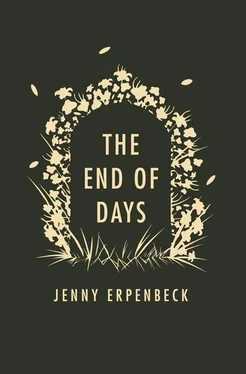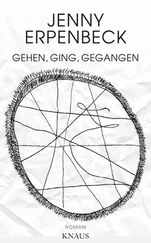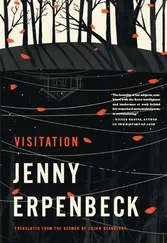Jenny Erpenbeck - The End of Days
Здесь есть возможность читать онлайн «Jenny Erpenbeck - The End of Days» весь текст электронной книги совершенно бесплатно (целиком полную версию без сокращений). В некоторых случаях можно слушать аудио, скачать через торрент в формате fb2 и присутствует краткое содержание. Год выпуска: 2014, Издательство: New Directions Publishing, Жанр: Современная проза, на английском языке. Описание произведения, (предисловие) а так же отзывы посетителей доступны на портале библиотеки ЛибКат.
- Название:The End of Days
- Автор:
- Издательство:New Directions Publishing
- Жанр:
- Год:2014
- ISBN:нет данных
- Рейтинг книги:4 / 5. Голосов: 1
-
Избранное:Добавить в избранное
- Отзывы:
-
Ваша оценка:
- 80
- 1
- 2
- 3
- 4
- 5
The End of Days: краткое содержание, описание и аннотация
Предлагаем к чтению аннотацию, описание, краткое содержание или предисловие (зависит от того, что написал сам автор книги «The End of Days»). Если вы не нашли необходимую информацию о книге — напишите в комментариях, мы постараемся отыскать её.
The End of Days — читать онлайн бесплатно полную книгу (весь текст) целиком
Ниже представлен текст книги, разбитый по страницам. Система сохранения места последней прочитанной страницы, позволяет с удобством читать онлайн бесплатно книгу «The End of Days», без необходимости каждый раз заново искать на чём Вы остановились. Поставьте закладку, и сможете в любой момент перейти на страницу, на которой закончили чтение.
Интервал:
Закладка:
Around nightfall, her breasts begin to grow hard and ache. She still has milk — milk for a baby lying in the ground. She’d like best to die now of this overabundance. When her baby was still gasping for air and then turning blue, she had imagined making the child a gift of all the years of life still remaining to her, haggling with the God of her forefathers, exchanging her own life for the life that had emerged from her. But God, if he existed, had rejected her gift. She remained alive. Now she remembers once more how after her marriage her grandmother never again permitted her to come along on visits to her grandfather. Only after her baby arrived and she insisted on showing it to him did she learn that on her wedding day her grandfather had sat shiva for her, his granddaughter, the living bride who had married a goy; despite his weakness he had sat there on his bed for seven days. From above, seen from the heaven her grandfather believes in, she too has already crossed the border from life to death and no longer possesses anything she might barter to strike a deal with God. When night comes, she pushes aside the bowls of food and lies down to sleep beside the footstool. She doesn’t hear her mother go to bed. She doesn’t even hear her husband come home. Sometime during this night it is exactly twenty-four hours since the unexpected death, in a small Galician town — 50.08333 degrees latitude north, 25.15000 degrees longitude east — of an infant child.
2
An old man lies in bed in a dark cottage and does not speak. He’s been lying like this for a long time now, day in and day out, he knows people are saying he’s on his deathbed, but while for some people dying is a narrow antechamber to be crossed in a single leap or stride, the dying in which he lies is so huge that he cannot find his way across, perhaps because he is already so weak.
His wife sits beside him, she sits for a long time without saying anything; meanwhile it’s already dark again outside. The Lord gave, and the Lord took away, she says at last.
That spring his wife had often sat knitting beside him, and although his eyes were no longer so good, he had seen that the garments she was working on were very small. And then one day she had taken the provisions that were to have lasted an entire week, baked a cake and left the house with it. There was no egg in the soup on the Sabbath. There was no need for him to ask, nor for her to explain.
Early this morning while it was still dark, still half asleep, he heard his wife and daughter whispering in the parlor; then, after lunch, his wife left the house and didn’t return until nightfall, sitting down beside him and saying at last after a long silence: The Lord gave, and the Lord took away.
The old couple hadn’t been invited to their granddaughter’s wedding. On the day their granddaughter married a goy, the old man sat up in his bed and stayed sitting like that for seven days, sitting shiva for this living bride as was customarily done only for the dead.
Now his wife sits in silence beside him, her elderly, bed-ridden husband, and shakes her head. God knows what our meydele was thinking, marrying her daughter to a goy, the old man says.
3
She takes the blankets out of the cradle, takes off the pillowcases, strips the cradle’s fabric canopy from its wooden frame, and pushes the cradle into a corner. The misfortune had begun many years before, when her daughter was still an infant. When they heard the noise outside, her husband had immediately sent the wet nurse up to the nursery with the baby, telling her to bolt the door and not open it under any circumstances if there was a knock, and to close the shutters tightly. Then the two of them ran from window to window downstairs to see what was going on: A crowd appeared to be forming in the surrounding streets, and across the way, on the square, some were running, some were shouting, but what they were shouting was unclear. She and her husband hadn’t managed to get the downstairs shutters closed before the first stones struck the house. Her husband tried to see who was throwing the stones and recognized Andrei. Andrei, he shouted out the window, Andrei! But Andrei didn’t hear him — or pretended not to, which was more likely, since he knew perfectly well who lived in the house he was throwing stones at. Then one of Andrei’s stones came hurtling through a window pane, passing just a hair’s breadth from her head, and crashed into the glass-fronted bookcase behind her, striking Volume 9 of the leather-bound edition of Goethe’s Collected Works that her husband’s parents had given him as a gift when he finished school. No breath of air disturbs the place, / Deathly silence far and wide. / O’er the ghastly deeps no single / Wavelet ripples on the tide . Hereupon her husband, filled with rage, flung open the front door, apparently intending to seize Andrei by the collar and bring him to his senses, but when he saw Andrei running toward the house with three or four other young men, one of them brandishing an axe, he slammed it shut again at once. Quickly, he turned the key in the lock, and together with his wife tried to take up the boards that always stood ready beside the door, waiting for just such an emergency, taking them and trying to nail them over the door. But it was already too late for this — where were the nails, where the hammer? — for the door was already beginning to splinter beneath the blows of the axe. Andrei, Andrei. Then she and her husband ran up the stairs, banging on the door behind which the wet nurse sat with the baby, but she didn’t open the door: either because she didn’t understand who was asking to be let in, or because she was so frightened she was unwilling to open it. The woman and her husband then fled to the attic, up one last steep flight of stairs, while down below, Andrei and his men were already bursting into the house. On the ground floor, the intruders smashed the remaining window panes, ripped the window frames from the wall, knocked down the bookcase, sliced open the eiderdowns, smashed plates and jars of preserves, threw the contents of the pantry out into the street, but then one of them must have heard her and her husband trying to lock the attic door, for without stopping on the second floor, the men now raced up the stairs, tearing down the wallpaper as they ran and banging holes in the wall with the axe. She and her husband stood behind the attic door, which was very thin, they’d locked it but hadn’t found furniture heavy enough to barricade the door, and now they heard the men’s footsteps on the last steep flight of stairs. Hear my prayer, O Lord, and give ear unto my cry; hold not thy peace at my tears: for I am a stranger with thee, and a sojourner, as all my fathers were. O spare me, that I may recover strength, before I go hence, and be no more. O Lord in heaven. If the way below was barred to them, there had to be an escape route above. They began to push the roof shingles away with their hands, creating an opening. But the door behind them that was momentarily holding off their pursuers was thin, just a few boards. Her husband helped her pull herself up and clamber through the opening onto the roof. And then she tried to pull him up after her. And that’s when the thin door could no longer withstand the attackers’ blows. And then she was pulling him up by one arm while the men below were pulling him down by the other. Lot refused to surrender the angels who were his guests. Lot stood on the threshold, and the mob seized him by the arm, trying to pull him out into the street to be punished for the hospitality he extended, wanting to have at least him to strike at, spit on, trample, and abuse; but the angels took hold of his other arm from inside the house with their angelic hands, and they were strong, they smote his attackers with blindness, pulled Lot back into the house, shut the door between him and the people, and those outside could no longer see one another, could no longer even see the door to Lot’s house, they groped their way along the walls and had no choice but to withdraw. Make no tarrying, O my God. She doesn’t have the strength of angels, she doesn’t succeed in pulling her husband up to where she is. As she holds tight to her husband’s arm, she implores Andrei, whom she has known since he was a baby, to have mercy, and she implores the men she doesn’t know to have mercy as well, including the one holding the axe, but while she is still holding tight to her husband’s hand, her husband down below is being first insulted and then beaten by the men she doesn’t know and also by Andrei, whom she has known since he was a baby, Mercy, and finally before her eyes they begin to swing the axe. She does not let go. First she is holding her husband by the hand, and then all she is holding is a clump of flesh, for there is no longer anything alive left that she might pull up to where she crouches in the open air. Then she is a Jewish widow holding Death by the hand. She lets go, gets up, and looks down at the small town beneath her and the open landscape. It’s broad daylight, there are thatch roofs and roofs covered in shingles, there are streets, squares, and fountains, and in the distance fields and woods, cows standing in a meadow, a coach driving down a dirt road, in front of the house people stand looking up at her, unmoving now and silent. Then, suddenly, she sees that it is snowing. Everything will freeze, she thinks, and a good thing too, she thinks, snow, snow. Losing consciousness, she tumbles, rolls down off the sloping roof, and falls, as luck would have it, on the heap of clothes, linens, and curtains thrown out onto the street by the men, and she remains lying there in the heap of rags, amid blood consisting of the raspberry jam she herself made the summer before, the jar shattered when it was thrown, and now she lies there, her limbs broken, her eyes closed, and none of the people standing there silently in the square comes closer or checks to see if she is still alive. She is alive, but at this moment she herself does not yet know it. The flurries have been further stirred up by her fall, more feathers float into the air from the slashed comforters, delicate goose down drifts around, slowly descending upon the branches of the trees: snow, snow, just like in winter.
Читать дальшеИнтервал:
Закладка:
Похожие книги на «The End of Days»
Представляем Вашему вниманию похожие книги на «The End of Days» списком для выбора. Мы отобрали схожую по названию и смыслу литературу в надежде предоставить читателям больше вариантов отыскать новые, интересные, ещё непрочитанные произведения.
Обсуждение, отзывы о книге «The End of Days» и просто собственные мнения читателей. Оставьте ваши комментарии, напишите, что Вы думаете о произведении, его смысле или главных героях. Укажите что конкретно понравилось, а что нет, и почему Вы так считаете.












